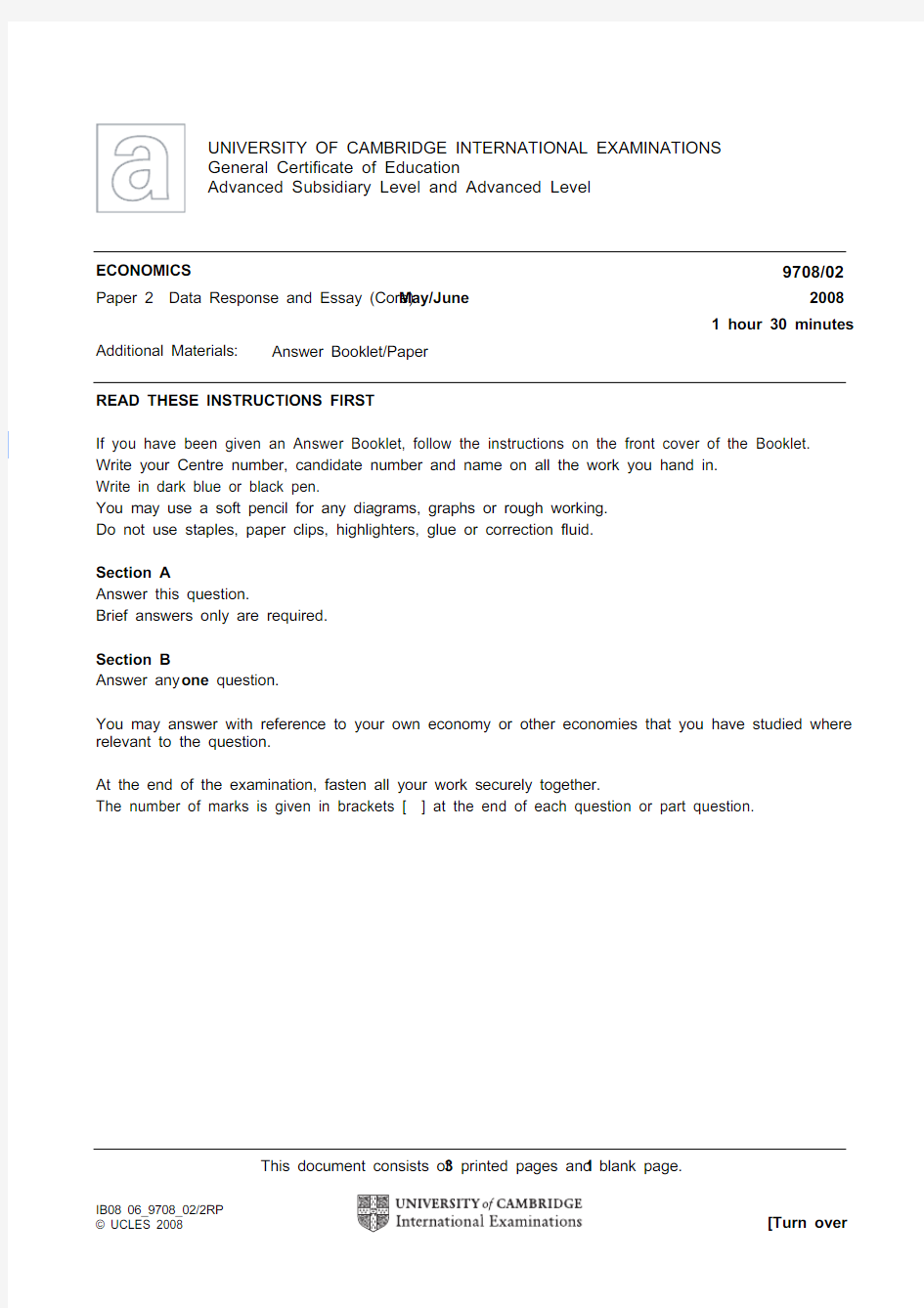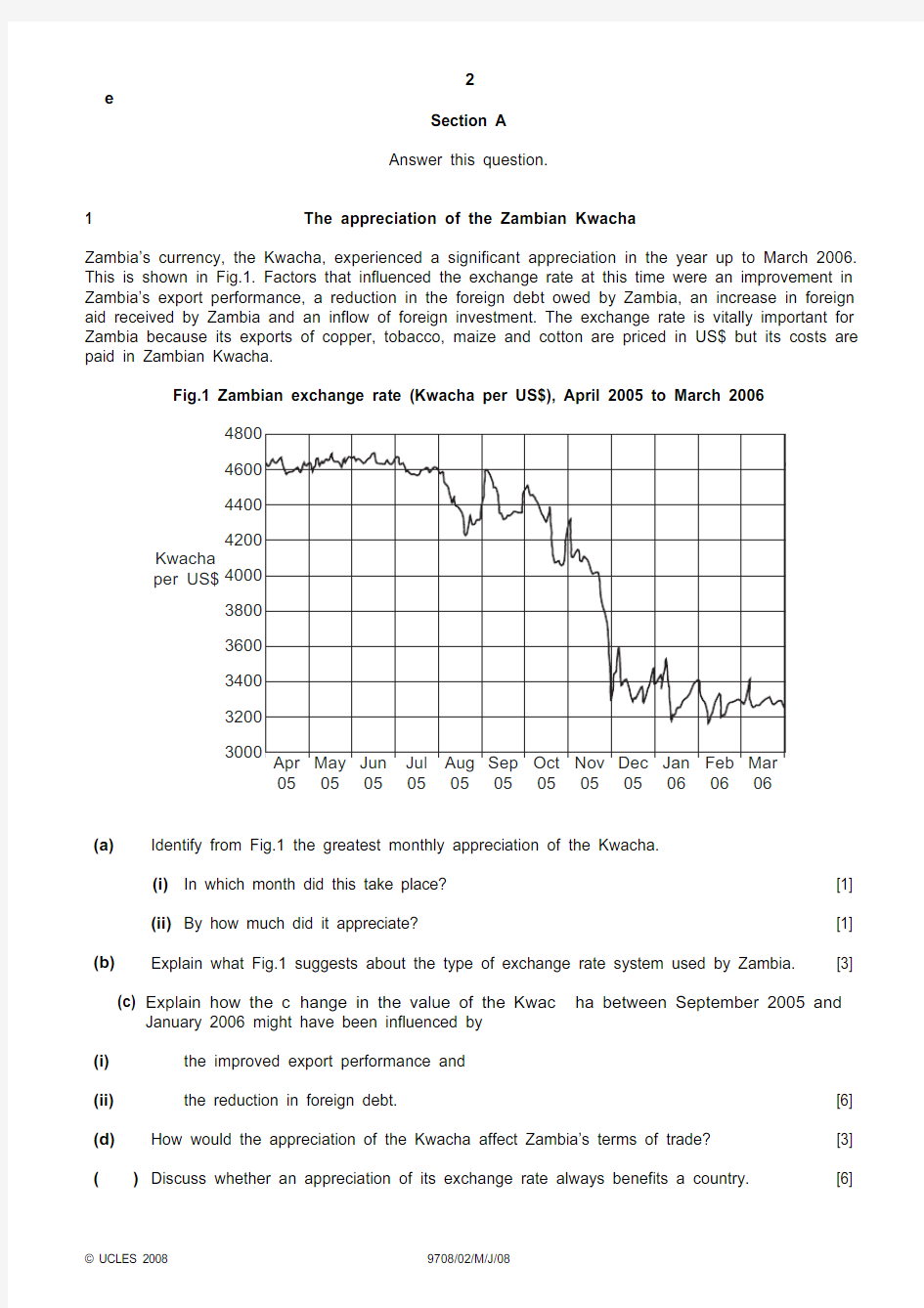June.2008.p2


This document consists of 3 printed pages and 1 blank page.
IB08 06_9708_02/2RP
? UCLES 2008 [Turn over
*8518745778*
UNIVERSITY OF CAMBRIDGE INTERNATIONAL EXAMINATIONS General Certificate of Education Advanced Subsidiary Level and Advanced Level
ECONOMICS 9708/02
Paper 2 Data Response and Essay (Core) May/June 2008
1 hour 30 minutes
Additional Materials: Answer Booklet/Paper READ THESE INSTRUCTIONS FIRST
If you have been given an Answer Booklet, follow the instructions on the front cover of the Booklet.
Write your Centre number, candidate number and name on all the work you hand in.
Write in dark blue or black pen.
You may use a soft pencil for any diagrams, graphs or rough working.
Do not use staples, paper clips, highlighters, glue or correction fluid.
Section A
Answer this question.
Brief answers only are required.
Section B
Answer any one question.
You may answer with reference to your own economy or other economies that you have studied where
relevant to the question.
At the end of the examination, fasten all your work securely together.
The number of marks is given in brackets [ ] at the end of each question or part question.
2
? UCLES 2008 9708/02/M/J/08
Section A
Answer this question.
1 The appreciation of the Zambian Kwacha
Zambia’s currency, the Kwacha, experienced a significant appreciation in the year up to March 2006. This is shown in Fig.1. Factors that influenced the exchange rate at this time were an improvement in Zambia’s export performance, a reduction in the foreign debt owed by Zambia, an increase in foreign aid received by Zambia and an inflow of foreign investment. The exchange rate is vitally important for Zambia because its exports of copper, tobacco, maize and cotton are priced in US$ but its costs are paid in Zambian Kwacha.
Fig.1 Zambian exchange rate (Kwacha per US$), April 2005 to March 2006
Apr 05May 05Jun
05Jul 05Aug 05Sep 05Oct 05Nov 05Dec 05Jan 06Feb 06Mar 064800
4600
4400
4200
4000
3800
3600
3400
3200
3000Kwacha
per US$
(a) Identify from Fig.1 the greatest monthly appreciation of the Kwacha.
(i) In which month did this take place? [1]
(ii) By how much did it appreciate? [1]
(b) Explain what Fig.1 suggests about the type of exchange rate system used by Zambia. [3]
(c) Explain how the c hange in the value of the Kwac ha between September 2005 and
January 2006 might have been influenced by
(i) the improved export performance and
(ii) the reduction in foreign debt. [6]
(d) How would the appreciation of the Kwacha affect Zambia’s terms of trade? [3]
(e ) Discuss whether an appreciation of its exchange rate always benefits a country. [6]
Section B
Answer one question.
2 (a) Explain the three economic questions that all economies face because of the basic economic
problem. [8] (b)
Disc uss whether the pric e mec hanism is an effec tive way to solve the basic ec onomic
problem. [12]
3 (a) Explain what determines the size of a country’s labour force. [8]
(b)
Discuss whether a widespread shortage of labour might be a major cause of inflation. [12] 4 (a) Explain what is meant by a current account deficit. [8]
Disc uss the effec tiveness and desirability of imposing tariffs to c orrec t a c urrent ac c ount (b)
deficit. [12]
? UCLES 2008 9708/02/M/J/08
BLANK PAGE
Copyright Acknowledgements:
Question 1 Fig. 1 ? 2007 by Prof. Werner Antweiler, University of British Columbia, Vancouver BC, Canada.
http://fx.sauder.ubc.ca/cgi/fxplot?b=USD&c=ZMK&rd=365&fd=1R
Permission to reproduce items where third-party owned material protected by copyright is included has been sought and cleared where possible. Every
reasonable effort has been made by the publisher (UCLES) to trace copyright holders, but if any items requiring clearance have unwittingly been included, the
publisher will be pleased to make amends at the earliest possible opportunity.
University of Cambridge International Examinations is part of the Cambridge Assessment Group. Cambridge Assessment is the brand name of University of
Cambridge Local Examinations Syndicate (UCLES), which is itself a department of the University of Cambridge.
9708/02/M/J/08
